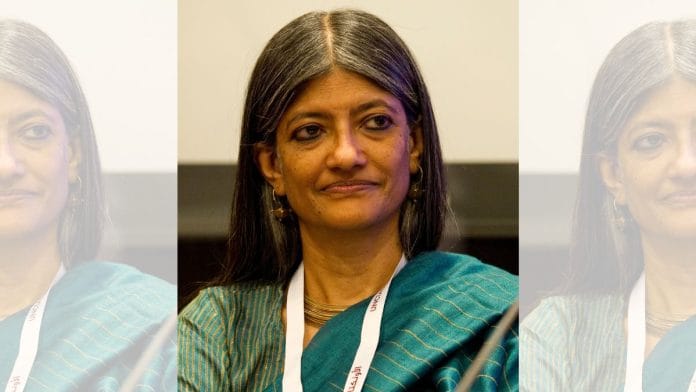New Delhi: Developmental economist Jayati Ghosh has been awarded the prestigious John Kenneth Galbraith Award by the Agricultural & Applied Economics Association for 2023, in recognition of her “breakthrough discoveries in economics” and her “contributions to humanity”.
While her award was announced in March, it was formally handed over to her with the official citation Tuesday.
The annual award, named after the influential Canadian-American economist John Kenneth Galbraith, was instituted in 2003 to honour his “capacity to integrate scholarship with statesmanship, and his unparalleled record of achievements in research, education and public service, embody the spirit and aspiration of agricultural economists”, according to the website of the Agricultural & Applied Economics Association.
Ghosh is one of just three Indian or Indian-born economists to have received the award since its inception — the other two being Sir Partha Dasgupta in 2007 and Gita Gopinath in 2021. Other awardees include Nobel prize winner Joseph E. Stiglitz (2004), Angus Deaton (2009), and Dan Ariely (2017).
Ghosh’s research and writings, cited extensively by the Left, focusses on developmental and human-centric economics, and is increasingly important for policymaking in the post-pandemic world, according to politicians and economists alike.
The complete citation for Ghosh’s award says it was given to her “in recognition of breakthrough discoveries in economics and outstanding contributions to humanity through leadership, research and service”.
Ghosh is currently professor at the University of Massachusetts Amherst, and is a member of the high-level advisory board on ‘effective multilateralism’, established by United Nations Secretary-General Antonio Guterres.
She has written a number of research papers and books on a wide variety of subjects, with recent topics including the fallout of the Covid-19 pandemic in India, the plight of women workers in the informal economy, and the fallout of the Indian government’s demonetisation decision of 2016.
“The kind of work Jayati Ghosh has been doing in developmental economics has always been important, but it has become even more important in the post-pandemic world,” Sitaram Yechury, Secretary-General of the Communist Party of India (Marxist), and an economist, told ThePrint.
“Her focus has been people-centric development rather than profit-centric development, and this is increasingly becoming key to policy making,” Yechury added.
Also read: Modi govt has a split personality—innovative on disinvestment, regressive on credit card spends
Her work
Ghosh’s work has been focussed on the plight of workers and several of her policy recommendations have centred around providing social protection to them.
For example, in a 2016 paper published by the International Labour Organisation (ILO), she noted that “while India has achieved high economic growth rates in recent years, this has not been matched by equal advances in decent work and employment creation”.
To rectify this, Ghosh recommended specific measures aimed at the poor, such as improved financial inclusion, expanded social protections, and the public provision of basic social services and active labour market policies (ALMPS).
“These would help expand opportunities in the formal economy, provide workers with a basic livelihood through social protection floors, preserve the employment relationship and allow for targeted interventions during economic downturns to minimise the economic and social costs,” Ghosh argued in the paper.
“She has had a very long-term interest in the question of gender and gender economics and, in addition, she has been deeply concerned with the human development aspects of economics,” said Prabhat Patnaik, who retired from the Centre for Economic Studies and Planning at Jawaharlal Nehru University, and who taught Ghosh in the 1970s, to ThePrint.
Patnaik added that such developmental work is especially important in a post-Covid world where the global economy is facing a downturn and where several countries are facing acute debt crises.
“The world economy moving into a secular stagnation, with a concentrated debt burden on many countries such as Bangladesh and Sri Lanka, is going to impose a very heavy burden on the working people due to the austerity measures,” he explained.
“Jayati has been working on that for quite some time now, and has written a lot on the situation in Sri Lanka,” he added. “She has been concerned with the severe effects of the debt crisis of many third-world countries on the working people. These have become particularly important in the present moment.”
(Edited by Zinnia Ray Chaudhuri)
Also read: Indian freebies are working. But it’s not reducing poverty, only making people spend less






